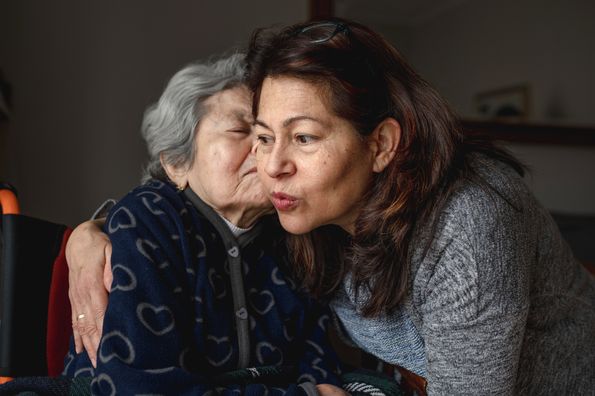If your loved one is aging or becomes sick, you might find yourself in a new role and new responsibilities. Being a caregiver for a parent or spouse who is getting older, or for anyone who is sick, can be overwhelming at times.
Caregiving by the Numbers
- 80% of adults over 60 want to stay and receive care in their own homes if they can.
- From 2015 to 2020, 53 million people provided unpaid caregiving to a loved one.
- 23% of adults in the US say that caregiving had a negative impact on their health.
As a caregiver, you may find yourself putting all of your time and energy into caring for someone else — and forgetting to take care of your own health at the same time.
Here are 9 tips to help you prioritize your own physical, mental, and emotional health.
Managing Stress and Your Mental Health
1. Take Time for Yourself
Many caregivers experience stress or caregiver fatigue as a result of their role. It’s important to find ways to relieve stress for your mental and physical health. When you find yourself feeling overwhelmed, take five minutes to breathe or walk, and set aside time every day to do something just for you. Even something as small as reading a book or doing a crossword can help you slow down and focus on yourself.
2. Speak Kindly to Yourself
You may find yourself talking to yourself throughout the day. When caregiving gets challenging, you might internally be saying things like, “I can’t do it,” or “I should be doing more.” How you talk to yourself can have a big impact on your self-esteem and your attitude. Throughout the day, try shifting to more positive language like, “I can do this,” or “I’m doing the best I can — and my best is good enough.”
3. Seek Professional Help When Needed
Caregiving can be challenging. In fact, 66% of adults providing care for an older loved one reported negative mental or behavioral health symptoms. Sometimes just taking time for yourself or doing daily stress management isn’t enough to make you feel better — and that’s okay. Our Duly Behavioral and Mental Health care team and primary care providers can provide the support and resources you need to navigate your emotions and caregiving journey.
Prioritize Your Physical Health
4. Attend Your Annual Wellness Visit
Twenty percent of caregivers report not attending their annual wellness visit. While it might just seem like one appointment you’re missing, your annual wellness visit plays a key role in you and your provider monitoring your health. During your visit, your provider will check in with you about your lifestyle and do necessary tests for health conditions including diabetes, high blood pressure, or cancer. By scheduling a wellness visit each year, both you and your provider can keep a better record of any health changes or potential concerns.
5. Stretch and Get Moving
Caregiving can be hard on your body and physical health. You may find yourself using different muscles than you usually use and feeling sore or strained. Exercising and stretching each day — even for just a few minutes — can help you protect your body, relieve stress, and stay healthy.
6. Get Some Sleep
Getting enough sleep each night is a crucial part of maintaining your health. When you get enough sleep, you can reduce your risk for sickness, heart disease, diabetes, injury, and other health problems. Despite this, almost 37% of caregivers report getting less than 7 hours of sleep each night. Some ways you can get a better night’s rest include establishing a bedtime and morning routine, creating a relaxing sleep environment, limiting screen time before bed, and exercising during the day.
Don’t Isolate Yourself — Ask for Help
7. Think About What Skills or Interests Your Friends Have
It can be difficult to think of what kind of help you can ask for from friends or family. Take some time on your own to think of your loved ones’ skills or interests. If you have a friend who likes to cook, ask if they can make you a meal. Or if your sister loves to work out, ask her to go on a walk with you once a week. Be specific, and don’t feel bad for needing — or wanting — help.
8. Join a Caregiver Support Group
Caregiving can be a lonely journey, but it doesn’t have to be. There are many local support groups that can give you a place to connect with other people going through similar experiences as you are.
9. Remember — It’s Okay to Ask for Help
There are many reasons you may not want to ask for help from friends, family, or a professional caregiver. You may feel guilty you can’t do it all yourself or worried about the level of care your loved one will receive. Reflect on your feelings about asking for help, and remind yourself that it’s okay to need help — and to ask for it.
The Duly Health And Care team can support you throughout your caregiving journey. Schedule a visit with your primary care provider or a behavioral and mental health specialist today.
Health Topics:







